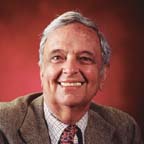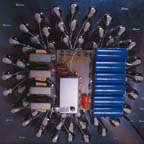
Fishwick honored for internationalizing popular culture
Physicists may find particle smaller than quark
Tech researchers issued 25 patentsd
Tech Tech professors enjoy on-camera stints

Virginia Tech and Hyderabad, India, have something in common -- the energy of Virginia Tech popular-culture professor Marshall Fishwick.
Fishwick has been instrumental in establishing in Hyderabad the American Studies Research Center, which now houses the largest collection of American books in Asia.
The American studies and popular-culture professor was honored in February by the American Culture Association and the Popular Culture Association with the Ray and Pat Browne Award for lifetime achievement.
Fishwick went to India in July, where he l led four regional conferences scheduled by the U.S. Information Agency. An experienced traveler, he has received Fulbright grants to Denmark, Germany, Russia, Italy, Korea, and India. His new journal, International Popular Culture, is based on the work of colleagues in these countries.
Fishwick's latest textbook, An American Mosaic: Rethinking American Culture History, employs technology that allows for constant revision and updating. His other publications include: The Hero, American Style; Great Awakenings: Religious Awakenings in America; Clara Barton; Go and Catch a Falling Star, and others.
Analysis of data taken at an electron-proton collider in Germany from 1994 to 1996 has revealed five "events" that may change the standard model of matter, according to Tech physics professor Luke Mo, who is a member of the executive group for the ZEUS experiment.
Scientists are working in miles-long underground facilities to force the collision of submicroscopic particles in an effort to discover the smallest building block of all matter, the particle that cannot be further split into parts.
Until a few decades ago, the electron, proton, and neutron, which make up the atom, were considered the basic building blocks of all matter. Now scientists know there are subparticles, such as quarks.
But the data collected during the 1994-96 experiments suggests that quarks are not the smallest particles. "We're not sure what it's about," Mo says, "It could mean the quark is not the smallest particle or it could be merely a statistical fluctuation."
The researchers, excited by the new finding, began new experiments in March to see if the data backs up the discovery. If it confirms the findings, the researchers will need more energy than they have now to probe further and further into the subparticles (the smaller the distance, the greater the energy needed). Such energy requires a large hadron collider, which smashes proton against proton. Two such experiments have been approved, the ATLAS and the CMS at CERN, Geneva, Switzerland. Researchers at Virginia Tech are members of the latter.

Virginia Tech researchers earned 25 patents during 1996. Areas related to electronics and materials received the most patents, with faculty members and students in the Virginia Power Electronics Center (VPEC) and the Center for Advanced Ceramic Materials receiving three each.
Patents ranged from a zero-current transition switching technique to a high-temperature curing agent for adhesive materials and two patents for methods of diagnosing and treating the risk of hypertension during pregnancy. These patents are being marketed by Virginia's Center for Innovative Technology.
The joke at history professor Glenn Bugh's house is that he'll end up on the cutting-room floor and all that will be left of him in the television documentary "Caligula" for A and E's Biography will be "Glenn Bugh, Consultant" in the credits.
Bugh is one of a growing number of Virginia Tech professors who have been recruited by film-production companies making documentaries for the Discovery Channel, the Arts and Entertainment (AandE) network, and other film projects. Psychologist Sigrid Gustafson, for example, recently was flown out to San Francisco to tape a program for Discovery on "Wild Rides II" about people who ride roller coasters and other risky vehicles. The crew liked her expertise about risk takers so much they interviewed her for a second program, "Extreme Rides."
Bugh and Gustafson join other Virginia Tech professors whose expertise has been in demand by television. These include James Robertson, history professor who has made several appearances on programs about the Civil War shown on AandE, public television, and other networks; Clifton Bryant, who was interviewed extensively for AandE channel's "Ancient Mysteries" series episode on ancient burial rites; and Doris Zallen, associate professor in the Center for Interdisciplinary Studies, who served as an off-camera consultant for a segment of the television drama series "Chicago Hope" devoted to gene therapy.
Home | News | Features | Research | Philanthropy | President's Message | Athletics | Alumni | Classnotes | Editor's Page